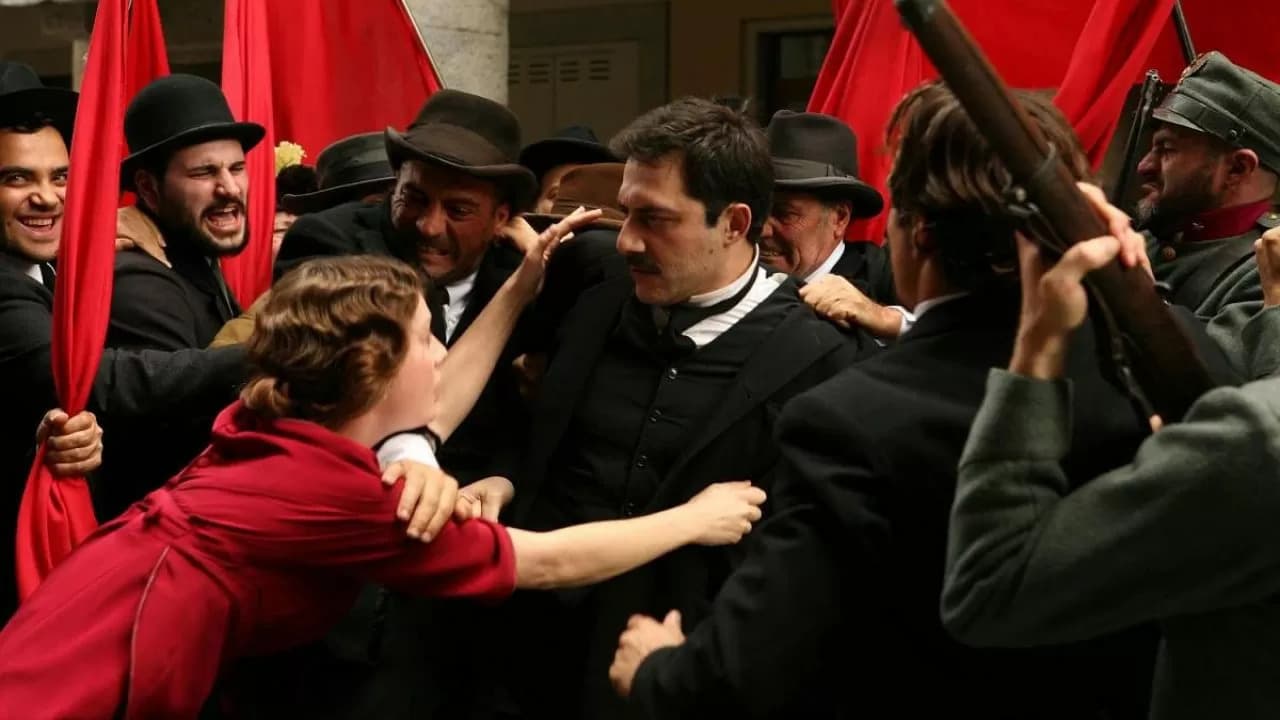

Some amazing, poetic imagery, a rich, almost operatic score, and a hyper-emotional yet always grounded lead performance by Giovanna Mezzogiomo make this film work.The story of Mussolini's cruelly rejected and forgotten wife and son (they were a problem politically, since it turned out he was already married) is certainly interesting, and a glimpse at the toll of dictatorship on a much more human scale. It was also gripping to see Mussolini portrayed as more complex and dangerously charismatic than the buffoonish cartoon he has become in the public's mind.That said, for me the film felt long at 125 minutes. The repetition with which Ida Dalser is locked away in various mental institutions and studiously ignored is at first powerful, but ultimately wearying. Perhaps I was over prepared, as so many critics declared this Bellocchio's best film in years, perhaps ever. But then, I was always a bit out of sync with the critical establishment re Bollocchio. I'm also not obsessed with "Fists in Pocket" his first film, widely regarded as a masterpiece. As with "Vincere" I liked it, but felt it milked one tone too long. I'm more drawn to his more subtle and complex work like "Good Morning, Night" and "Henry IV". But I will re-watch this, and I'm happy to have discovered this director's wonderful, unique, slightly surreal, yet still emotional work, even if it took me too many years to do so.
... View MoreI found this movie extremely absorbing, from beginning to end. It's true what other critics have observed that the real Mussolini in the old newsreels looks quite different from the actor personifying him, and the sudden confrontations between one and the other are quite unsettling. Could it be that recreating this historical newsreels with this actor as Mussolini was not possible due to the insufficient budget? Or maybe the director wanted to show us the real Mussolini to give us a good idea about the individual? Another confusing issue: The actor playing Mussolini also plays his adult son. And we don't get to see the final days of this dictator, when he was involved with Clara (Claretta) Petacci, his last lover, twenty eight years younger and executed with him (and both corpses hanged upside down in the public square). The photography and the camera work are exquisite, as are the lighting --absolute perfection-- the acting --masterful-- and the music --excellent. Very somber movie, shot most of the time in heavy darkness; there is no comic relief whatsoever, not even light humor, but then, the story is extremely dark and tragic, something that could have come out from a Dorothy Parker story.
... View MoreI just love allegories. I love the way so much imagination is poured into the re-telling of a story via new material. We all know our history, so we know about Benito Mussolini, Il Duce, and his reign of Fascism over Italy. But we don't know about the adulterous relationship he had with a certain Ida Dalser, who gave birth to his child and who Mussolini, in his unforgivable cold-bloodedness, calmly strived to strip apart. That's what Marco Bellocchio's new film, "Vincere", is all about: it's a historical drama about the woman Mussolini tried so hard to ruin after economically and sexually using her...and it's also a sublime allegory of how he used all of Italy.Critics worldwide have seen the genius behind portraying Mussolini's reign of terror as a headstrong but powerless woman. Ida Dalser (Giovanna Mezzogiorno) instantly falls under the spell of a young, handsome Mussolini (Filippo Timi). Italy is only beginning to experience the first waves of Socialism, and among those first to rebel against the government is this young man who has a certain power with words; in a scene where he runs away from the police for being involved in a riot, he shields himself behind the curious Ida who stepped out for a look, and passionately kisses her. I mean, Benito is a good kisser, or so he seems to be, because Ida melts in utter passion in his arms while he kisses her and he...well, he's a really good actor too, for he can focus his strength on this steamy kiss at the same time that his full concentration and awareness are scrutinizing the area to see if the police are gone. Sure enough, once they're gone he pushes Ida away and runs without so much as a half-hearted smile...but the kiss was enough for Ida to fall mercilessly in love with him.In a matter of days, she's stalking him, getting into his fights and showing him glimpses of her crotch which get our all-too human Benito hot for her. The first twenty-something minutes of the film our two main characters spend passionately and intensely going at it. Well, Ida does the passionate part and Mussolini, as I've said before, is a really good actor; while Ida spends her every second in a sexual Nirvana, he is all steam but his stare is distant, serious, no doubt thinking about anything else but the woman coming in his arms. Ida's obsession with the dude takes her as far as selling almost all of her things and giving him all the money so he can establish his own Socialist newspaper. Notice the incredibly sarcastic scene where Ida finally asks Benito to tell her 'I love you.' Mussolini, who at this point of the film hasn't gotten over his hate for Germans, plainly answers 'Ich liebe dich.' But this is an allegory, so here's where the plot thickens. Mussolini just happens to be married, Ida finds out, but he can't move himself to even let her go properly because he's becoming really powerful so he doesn't need her anymore. Ida gives birth to his child, but he couldn't care less. Ida's obsession is so deep, though, that she really starts pestering Benito every living moment she has...and by the time Benito is a 9-year old boy, Ida spills the cup and our villainous dictator sends her to an insane asylum and gives the custody of her son to one of his right-hand men. From here on, it's chaos...both in Italy and on our tragic heroine's life. Just as a side note, the film claims to be based on true events; obviously, the rise of Fascism in Italy IS a true event, but I can't vouch for the verisimilitude of Mussolini's secret lover. I'm ready to believe it, though, because he was such a horrid man that he must've done to thousands of women the very same thing he did to Ida. And not only women: I mean, didn't he screw up millions of people's lives by using them? The film brings the suffering of an entire war-torn country into a very intelligent perspective by allegorizing it into the character of Ida Dalser, and that's more than can be said by any recent historical drama.Sounds good, doesn't it? The acting is pitch-perfect, especially Mezzogiorno who redeems herself for her atrocious main performance in Mike Newell's "Love in the Time of Cholera" and manages to give us a heart-breaking, poignant, sublime and VERY powerful performance (I wonder why she didn't get an Oscar nod? Academy voters must've definitely been high). We see a woman who has no chance of survival, who'll never see her son again, whose life has been ruined by Italy's most powerful man, but her strength and courage stand true to the very last. The screenplay is VERY good, actually; Carlo Crivelli's score is one of the best scores I've heard in a long time (which sounds like a perfect cross between Philip Glass and Dario Marianelli) and Marco Dentici's cinematography couldn't possibly be better. Also, the film never lags, and it touches on so many levels of human suffering and cruelty, that you can't help but me moved to deeper thought. What more can you ask of a film? See it. Italy has outdone itself this year with such an excellent film. No one in their right minds could possibly be disappointed. Rating: 4 stars out of 4!!
... View MoreMuch has been told of Italian dictator Benito Mussolini, but Marco Bellocchio's "Vincere" tells of another period during the Fascist's life. Or rather, not his life, but the existence of his first wife Ida Dalser. Played to a tee by Giovanna Mezzogiorno, Ida met Benito (Filippo Timi) back when he was the editor of socialist newspaper Avanti. It was right before WWI when the future Il Duce broke away from the socialists and established the newspaper Il Popolo d'Italia. Not only that, having gotten injured in the war, Mussolini dumped Ida and Benito Jr. for his more famous wife Rachele (Michela Cescon).It this point, the movie shifts entirely to Ida and Benito Jr., while Mussolini is seen only in newsreels. It's as if Ida represents the common person in Italy. Whereas Mussolini used to be a common person, he suddenly becomes the distant, bombastic authority figure. Ida, meanwhile, is thrown into a mental institution. As her sanity deteriorates further and further, accompanied by the frigid weather, one gets a sense of what would soon happen to Italy.I had never known about this whole part of history, but it's good that the movie is recounting it. Without a doubt, this story serves to show what a megalomaniac Il Duce was - to say the least. But above all, it's important that we learn about the past so as not to repeat the mistakes.
... View More